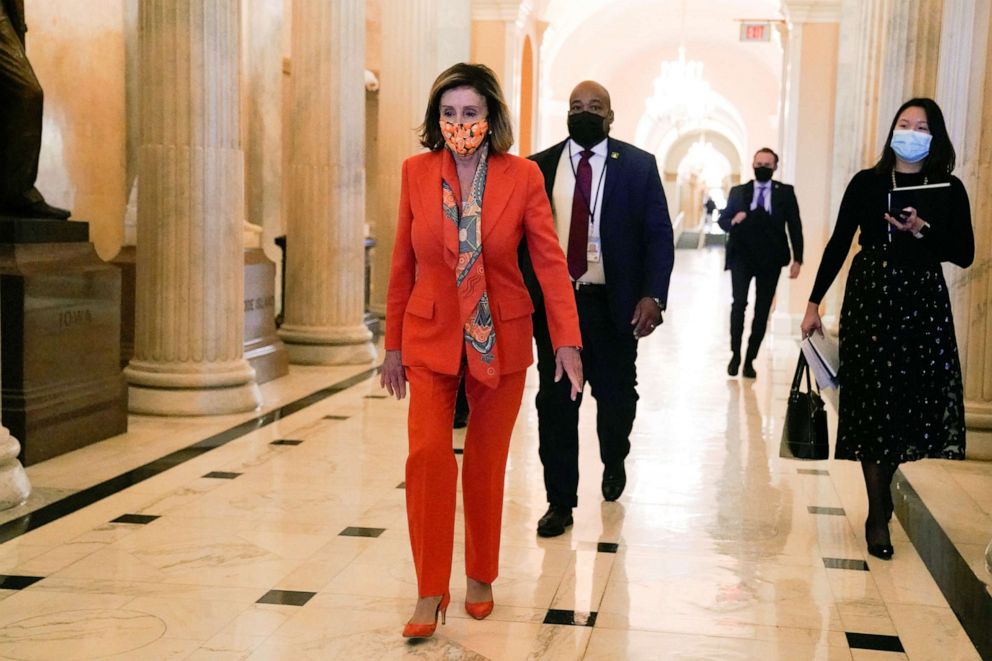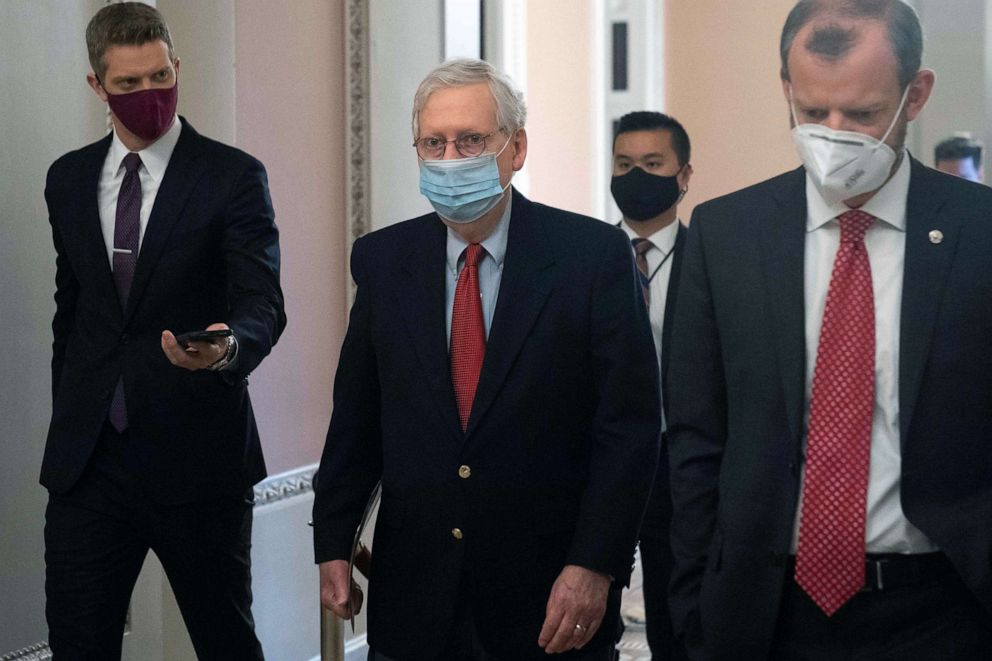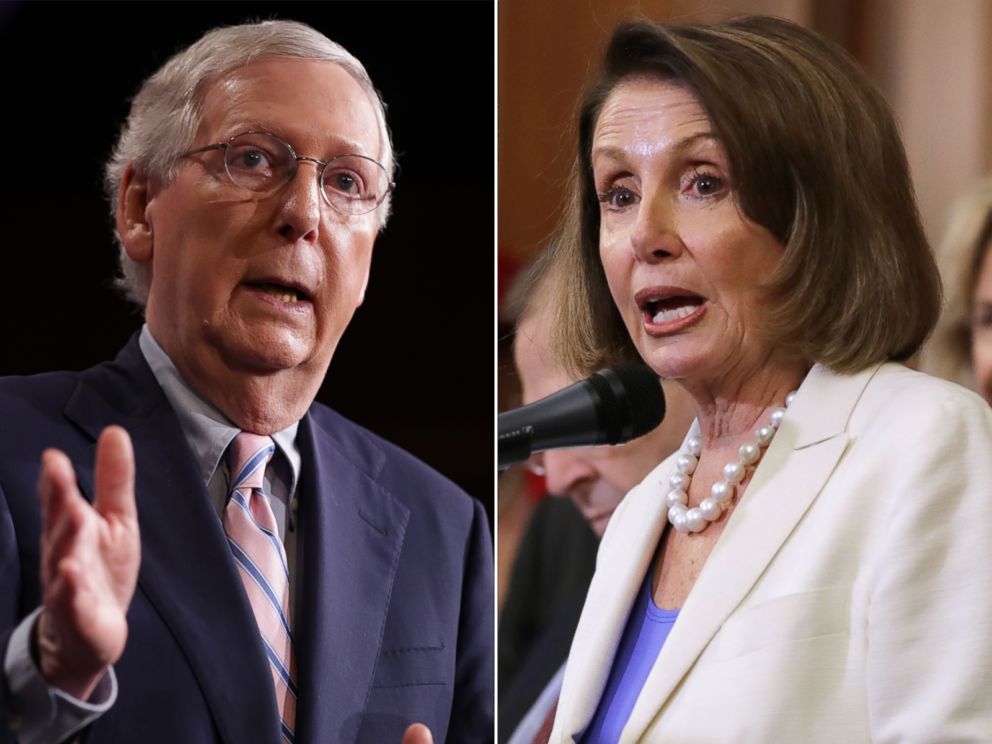Lawmakers reach COVID-19 relief deal
Legislators worked furiously against a tight government shutdown deadline.
After months of failed negotiations and contentious partisan gridlock, congressional lawmakers announced a roughly $900 billion stimulus package on Sunday that would send immediate relief to Americans and businesses besieged by the economic toll of the coronavirus pandemic - a deal more than eight months in the making.
"Moments ago, the four leaders of the Senate and the House finalized an agreement. It will be another major rescue package for the American people," Senate Majority Leader Mitch McConnell said on the floor Sunday night. "For the information of all senators and more importantly for the American people, we can finally report what our nation has needed to hear for a very long time: more help is on the way."
"As our citizens continue battling this coronavirus this holiday season, they will not be fighting alone," McConnell said. "Now we need to promptly finalize the text, avoid any last-minute obstacles and cooperate to move this legislation through both chambers."
House Speaker Nancy Pelosi and Senate Minority Leader Chuck Schumer called the plan a “package that delivers urgently needed funds to save the lives and livelihoods of the American people as the virus accelerates.” But they both made clear that more needs to be done, and said they would immediately push for more relief after President-elect Joe Biden takes office on Jan. 20.

The final bill text of the agreement is expected to be released on Monday. The $900 billion COVID-19 relief bill will be attached to a must-pass $1.4 omnibus spending bill that funds the government through September 2021. The $2.3 trillion package will be one of the largest spending bills Congress has passed in U.S. history.
The House intends to vote on the package Monday, quickly followed by the Senate.
Both chambers moved late Sunday night to pass a one-day stopgap funding bill to extend the government shutdown deadline through Monday night.
The COVID-19 agreement includes $600 for individuals making up to $75,000 per year, $1,200 for couples making up to $150,000 per year, as well as a $600 payment for each dependent child.
For example, a family of four would receive $2,400 in direct payments.
The bill provides $300 per week in enhanced federal unemployment benefits through March 14, 2021.
The measure would also provide more than $284 billion for businesses and would revive the Paycheck Protection Program, which expired over the summer. It would expand eligibility under the program for nonprofits, local newspapers and radio and TV broadcasters and allocate $15 billion for performance venues, independent movie theaters and other cultural institutions devastated by the restrictions imposed to stop the spread of the coronavirus.
It includes funds for loans from small and minority-owned lenders and directs another $20 billion to small business grants.
The agreement is also expected to provide billions of dollars for testing, tracing and vaccine distribution, as well as $82 billion for colleges and schools, $13 billion in increased nutrition assistance, $7 billion for broadband access and $25 billion in rental assistance.
The agreement is also expected to extend an eviction moratorium set to expire at the end of the year.
The bill also ends the practice of surprise medical billing.
The agreement also includes a tax break for corporate meal expenses lobbied for by the White House.
"After a long and arduous year, after a year full of bad news, finally we have some good news to dealer to the American people," Schumer said. "Make no mistake about it. This agreement is far from perfect, but it will deliver emergency relief to a nation in the throes of a genuine emergency."
Schumer emphasized, as he has several times in recent days, that the bill is not robust enough and should be viewed as a "down payment" that "should be viewed as a floor, not a ceiling."

President-Elect Joe Biden applauded the bipartisan agreement on coronavirus relief legislation in a statement Sunday, saying he is "heartened" to see lawmakers from both sides of the aisle come together to hammer out a deal that will help struggling Americans.
But while he applauded the agreement, Biden, as he has throughout the ongoing negotiations, cautioned that his and Congress' work is "far from over," and reiterated the major points of his plan to combat the pandemic and help the economy recover.
"We need to move immediately to create jobs and build back better than before," Biden said in a statement Sunday. "We cannot do this alone. Immediately, starting in the new year, Congress will need to get to work on support for our COVID-19 plan, for support to struggling families, and investments in jobs and economic recovery. There will be no time to waste."
The agreement comes as 12 million people are set to lose benefits if pandemic-era provisions to expand unemployment eligibility expire. Millions across the country face eviction if a federal moratorium expires at the end of the year.
All this comes as the rising number of COVID-19 cases are taking a toll on the economy: The number of Americans applying for unemployment benefits rose again to 885,000 in the week ending Dec. 12 -- the highest weekly total since September.
Congressional leaders worked through the weekend, but a deal was stalled over disagreements related to the Federal Reserve's lending powers.
GOP Sen. Pat Toomey of Pennsylvania was advocating for a provision on the Federal Reserve to be included in the final COVID-19 relief deal. His provision would block the next administration and the Federal Reserve from relaunching several expiring lending programs next year.
Democrats cried foul over the last-minute squabble and accused Republicans of inserting partisan language that would kneecap efforts by the incoming Biden administration to respond to economic crises.
“Right now, Democrats stand together. There was no dissension in the caucus. We cannot make a change like this," Sen. Elizabeth Warren, D-Mass., told reporters Saturday night on Toomey's provision.
"We keep trying. We're trying, but this is a new thing. And what they've asked for goes way beyond. This is the kind of thing that should have a strong legislative discussion," Senate Minority Leader Chuck Schumer said.
Despite the 11th hour haggling, negotiators remained optimistic that a deal would be reached.
A spokesperson for Senate Majority Leader Mitch McConnell confirmed late Saturday night that an agreement had been reached on the Toomey matter.
"Now that Democrats have agreed to a version of Senator Toomey’s important language, we can begin closing out the rest of the package to deliver much-needed relief to families, workers and businesses," McConnell spokesperson Doug Andres said.
Per a Democratic aide, Toomey agreed to drop the language prohibiting the fed from reestablishing lending facilities similar to the ones established in the CARES Act. Republicans also claimed victory, with Toomey's team outlining the compromise as one that prohibits the programs from being duplicated without congressional approval.
Leaders expressed frustration earlier in the week that their negotiations were once again up against a tight deadline.
“I am so frustrated by the inability of us to act like adults, with responsibility," House Democratic Leader Steny Hoyer of Maryland said Friday. "We have a government of 2 million people that are waiting every hour to find out if they are going to be working."
"I think McConnell is the principle culprit. But I don't think the rest of us are without blame," he said.
McConnell remained upbeat on coronavirus aid talks over the weekend.
"I appreciate the good faith spirit that has characterized my talks with the Democratic leader, Speaker Pelosi, Leader McCarthy, Secretary Mnuchin. But the American people cannot feed their families or pay their bills with Congress' good-faith discussions," McConnell said. "They need us to act."
The new COVID-19 relief legislation would "repurpose" over $400 billion in unused funds from the CARES Act, which Congress passed back in March -- which means this bill will include about $500 billion in new funding if the $900 billion top-line holds.

Democrats acknowledged defeat in getting $160 billion in aid for state and local governments in the deal due to Republican opposition.
At the same time, McConnell has agreed to set aside liability protections for businesses, which he had said was a "red line" for Republicans.
Democrats and Republicans alike both fought hard to include direct stimulus checks for Americans at $1,200 -- the same amount approved in the CARES Act by both chambers of Congress in March.
An effort by Sen. Josh Hawley, R-Mo., to secure $1,200 direct checks to Americans failed earlier Friday.
Hawley, who had been working with Sen. Bernie Sanders, I-Vt., on a direct check effort for several weeks, left the floor so frustrated that he said he may derail the short-term funding effort to prevent a government shutdown later Friday.
Hawley said he and other rank-and-file members have been left "in the dark for days" on what's in the relief package and without assurances that there are direct checks in the package and a package ready to be voted on, he's prepared to stand in the way of efforts to buy a bit more time with a short-term funding bill -- known as a continuing resolution or CR.
"I have no idea what is going on and I’m not prepared to sign off on a CR until I know what’s going on," Hawley said. "It's beginning to reach the point of absurdity. It's time for leadership to put on the table what they’ve got -- it's time for them to brief members on what they’ve got."
Hawley called the Senate's predicament a "self-inflicted wound."
"If we are going to spend hundreds of billions of dollars bailing out this, that and the other, surely we could start with reasonable modest relief to the working people in need in this nation," Hawley said on the floor.
Sen. Ron Johnson, R-Wis., opposed the measure out of concern that it was ineffective and would drive up debt.




